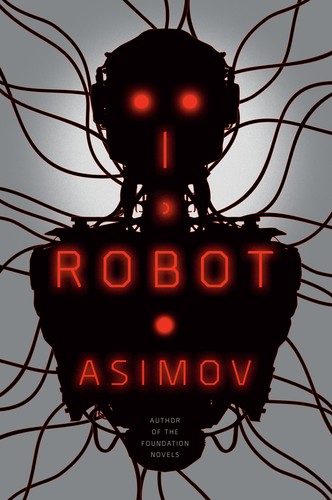Curtis reviewed I, Robot by Isaac Asimov (Robot (1))
Review of 'I, Robot' on 'Goodreads'
3 stars
Asimov is one of the greats for his ideas, if not exactly his prose. There's a lot to quibble about with respect to the artistry in this book — in particular, the yawn-worthy, pseudo-Socratic exposition (only a scientist could think that two scientists talking to each other makes for a fascinating story). But getting past those stylistic inadequacies, and a few anachronisms, it's still interesting to think about the technical, ethical, social and political problems presented by robots and "machine men."
One of the things that struck me as odd is the persistent insistence by characters — who are typically scientists or engineers — to call various outcomes or reasonings "impossible," only to be shown that such outcomes or reasonings are, in fact, quite possible. I have not decided yet whether this repetition is a grand insight on Asimov's part, i.e., a commentary on the tendency of humans to set artificial boundaries against their own imaginations, or whether it is simply a quirk of the author to need characters who express objection in the superlative to provide some level of tension in an otherwise rather mundane and technical conversation.
Much is made of Asimov's "Three Laws of Robotics," which are invoked significantly throughout the stories in this book. While I've run across the laws in others of Asimov's stories, I was a little dismayed to find that in this book they aren't treated quite as rigorously as I had been led to believe. In fact, there seems to be some inconsistency in how exactly the laws function. In some of the stories, it is stated that the laws are, somehow, integral parts of the positronic brain, and that it is "impossible" (there's that word again) for robots not to follow them. In other stories, we got robots who are deliberately modified to ignore parts of the three laws or who are damaged in some way so as to not be able to follow the laws appropriately. I suppose one could explain "positronic inherency vs. programmatic function" with a "nature vs. nurture" metaphor — but I'm not sure it quite works.
Overall, this is a decent collection that mostly holds up. If nothing else, it provides some insight into the ideas that science fiction writers in the early to mid 20th century were thinking about. If they take a different form than today's ideas, well, we can't blame them for that....
Incidentally, it's unfortunate that the terrible, terrible Will Smith movie is featured on the cover of this edition, not only because the movie itself sucked, but also because it has almost nothing to do with any of the stories in this book, beyond a common title.

